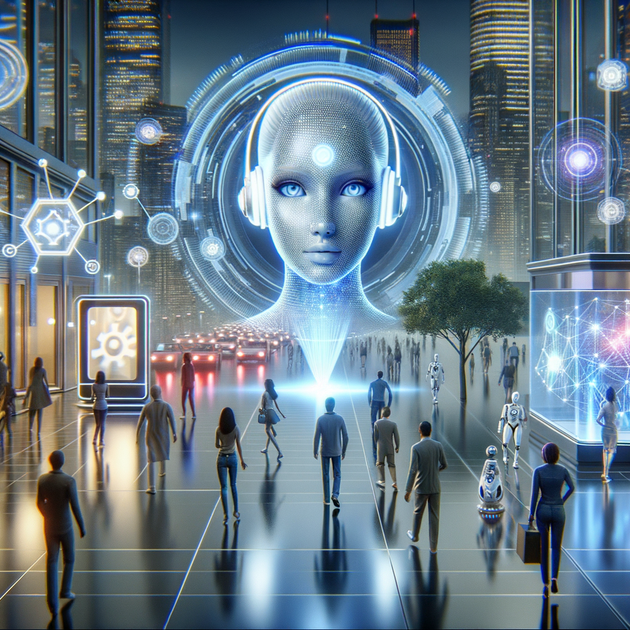Scarlett Johansson’s Voice & AI: Shaping the Future or Setting a Precedent?

This group of women was generated by Midjourney … it’s happening!
Imagine a world where Scarlett Johansson’s voice becomes the quintessential sound for artificial intelligence (AI) interactions. From virtual assistants on smartphones to automated customer service agents, her unmistakable voice could set a new standard. This scenario, intriguing as it seems, raises significant questions about ethics, legality, and the direction of AI technology.
The Unintended Standard: Scarlett Johansson’s Voice
Scarlett Johansson’s iconic voice in the movie “Her” showcased an emotionally engaging AI, leading to widespread appreciation. However, recent controversies surrounding unauthorized AI-generated similarities have sparked fervent discussions. Let’s delve into the reasons why her voice might inadvertently become an AI standard.
Market Demand and Technological Mimicry
Johansson’s voice, already embedded in the collective consciousness due to “Her,” makes a compelling case for AI developers. The market demand for a familiar, engaging voice drives the push towards replicating her vocal nuances. Despite legal challenges, technological mimicry persists, highlighting the allure of a recognizable voice.
Example: Imagine an AI system offering emotional support through a voice that exudes warmth and familiarity. Johansson’s voice provides that connection, making it a valuable asset for developers aiming for user engagement.
Legal and Ethical Implications
The potential ubiquity of Johansson’s voice in AI applications could usher in significant legal ramifications. Extensive legal action might ensue, focusing on protecting her unique vocal signature. Here’s what we might expect:
- Increased Legal Battles: Companies using voice clones without proper authorization could face a surge in legal challenges.
- Industry Standards: Stricter regulations and industry standards could be established to govern the use of AI-generated voices.
A Genius Move or Unintended Consequence?
Whether intentional or not, Johansson’s stance against unauthorized use could solidify her voice as the gold standard for AI technology. This could lead to an enduring legacy and enhanced value, making her voice synonymous with AI.
Example: Much like how Helvetica became an industry-standard font, Johansson’s voice could become the default choice for AI developers, leading to lucrative opportunities for authorized and ethical use.
The Broader Impact: Innovation vs. Regulation
Johansson’s situation underscores a critical point: the balance between innovation and the protection of individual rights. As AI continues to evolve, this balance becomes increasingly delicate, highlighting the need for clear guidelines and responsible frameworks.
The Risks of Opposing AI
Opposing AI without a clear strategy might lead to unintended and uncontrollable consequences. Johansson’s voice controversy exemplifies how resistance can inadvertently accelerate the adoption and unauthorized use of AI technologies.
Legal and ethical considerations surrounding AI are still developing, and opposition can create chaotic regulatory environments. Therefore, it is imperative to approach AI development with a balanced perspective, fostering innovation while establishing robust frameworks to manage its impact responsibly.
By resisting AI advances without strategic planning, we risk creating scenarios where misuse becomes rampant, ethical boundaries blur, and the original intentions of protecting personal rights are overshadowed by unregulated technological progress.
As AI continues to integrate into various facets of life, we must address these challenges thoughtfully. The discourse surrounding Scarlett Johansson’s voice provides a crucial opportunity to reflect on the intersection of human rights and technological advancement.
What do you think about the intersection of celebrity voices and AI technology? Share your thoughts in the comments below!
